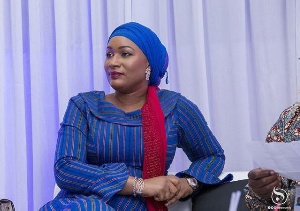Opinions of Wednesday, 7 March 2018
Columnist: Samira Bawumia
Ed of Samira Bawumia on International Women Day
Key themes: education, livelihoods/entrepreneurship, violence against women, affordability
Introduction: Hook
• Policymakers and practitioners have spent a lot of time and energy trying to progressively improve the livelihoods of women and girls by providing more educational opportunities, job skills training, and maternal health but this isn’t nearly enough when one considers issues like the lack of access to modern energy, and issues of time poverty of women within economic, social, and political systems. To effectively empower women and girls, we must address these systemic problems.
• It is important for governments and policy makers to focus on the root causes that prevent girls and women from advancing and unleashing their full potential. Chief among these is the lack of access to modern energy which eventually leads to negative health complications via household air pollution, loss of economic opportunities, and last but not the least, time poverty that women experience because of the disproportionate share of unpaid care work that falls on them. This includes performing routine household chores such as cooking which could lead to health complications via household air pollution, and walking long distances to collect water and firewood.
Challenge:
• More than 80 percent of Ghana’s population relies on solid fuels for their household cooking needs.
• More than 22 million people in Ghana are affected by exposure to household air pollution from dangerous, inefficient, and polluting cooking practices. In Ghana, we lose over 14,000 lives every year, mostly women and children, who do not have access to modern energy solutions while millions more suffer from cancer, pneumonia, heart and lung disease, blindness, and burns.
• A substantial portion of those deaths are children - more than 2,200, in fact, die every year because of acute lower respiratory infections caused using solid fuels.
• Studies also estimate that unpaid drudgery work being undertaken by women today amounts to as much as $10 trillion of output per year, roughly equivalent to 13 percent of global GDP.
• Women take on 75 percent of the world’s unpaid care work. In Ghana, women spend upwards of 100 minutes per day on meal preparation, and three times longer collecting firewood daily than men. This means spending between 37 to 44 minutes per day depending on their community’s proximity to firewood supplies. This multiplies out to approximately 2.2 million hours per year spent by Ghanaian women collecting fuel which will be used to prepare meals in an environment of air pollution, and lead to health complications for the women and children involved.
• Women and girls are disproportionately burdened with unpaid care work. Time poverty occurs when individuals have such elevated levels of unpaid care work due to the drudgery involved in the type of unpaid work that they do, and hence do not have enough time for rest, productive efforts, economic activities, social activities, and/or leisure, and they are unable to reduce the levels of unpaid care work required of them.
o This has real consequences for their ability to contribute to the nation as productive citizens within the family and the workforce.
o Time poverty caused by unpaid care work burdens for women and girls is a critical driver of gender inequality.
• In Ghana, women spend nearly three times as much time in transport activities for water, firewood, and crops compared with men, and they transport about four times as much in volume.
• One of the main causes for girls to miss school is the burden of household responsibilities. Girls’ school attendance is significantly more likely to be constrained by the need to perform household chores compared with boys. On average, girls are responsible for 5 hours more of household chores per week compared to boys. A reduction in these responsibilities through time-saving cookstoves and fuels has the potential to improve girls’ school attendance.
• Dedication to unpaid care work and the resulting time poverty create significant financial and opportunity costs that perpetuate poverty among women.
o Without time to access and progress in education, women and girls cannot gain or enhance skills that would qualify them for higher-wage jobs.
o Without time to earn income and accumulate savings, their vulnerability to poverty is higher.
o Constraints imposed by care responsibilities also contribute to the concentration of women in informal, low-waged, precarious, unprotected employment, in hazardous or unhealthy conditions with high risk to their health and well-being.
Solution: Clean and efficient cookstoves and fuels can significantly reduce unpaid work and increase gender equality
• Women who enjoy parity in education are more likely to share unpaid work with men more equitably
• Introducing more efficient stoves and alternative fuels can significantly reduce the time women spend on unpaid work related to meal preparation through faster cooking times and reduced firewood collection trips, as well as promote financial savings in the long term through cost-efficient fuels. The time and income recovered from these activities will allow more space and opportunity for activities that improve the well-being of women and girls and help to lift them out of poverty.
o In a pilot project supported by the Global Alliance for Clean Cookstoves with the Girl Guides in Ghana, 200 girls were trained on empowerment, entrepreneurship, advocacy, and cooking technologies and fuels. Afterwards, each household purchased a more efficient cookstove. As a result, the girls reported a 50% reduction in cooking time, as well as two hours saved per firewood collection trip. Additionally, this partnership has positioned the Ghana Girl Guides to be able to scale this awareness and empowerment to their network of over 20,000 girls and women.
o Since 2015, World Education Ghana has been working with the Alliance in collaboration with Ghana Education Service (GES) on a school-based intervention that has educated more than 3,000 students in clean cooking technologies and integrated clean cooking curriculum into 8 schools in the Greater Accra region. A draft curriculum has been developed to be integrated into the GES Basic School Education curriculum at a national level.
? With no clean cooking educational program in place the schools prior to this, and communities, a majority of those surveyed had little knowledge about clean household technologies
? 24,127 community members were reached through discussions and key messages on clean cookstoves and fuels
o The Alliance’s next step will be a pilot project to transform traditional school kitchens to clean cooking school kitchens to identify best practices for adoption and integration of clean institutional stoves in schools and to promote clean cooking technology as a living laboratory in schools where students and the community can observe and learn about benefits of clean cook technology and energy efficiency in school.
Ask/Call to action
o The evidence shows that time poverty due to unpaid care work is a major barrier to women’s empowerment and broader economic development. We also know that cooking and fuel collection are key components of unpaid care work.
o Unpaid care work needs to be firmly planted within the global development agenda, including the Sustainable Development Goals. While there is growing support for women’s health, education, and livelihood development – very little effort is focused on the issue of unpaid care work and advancing strategies to reduce it.
o Policy makers and investors should increase the prioritization of access to clean and efficient cookstoves and fuels as a means of addressing time poverty and gender inequality. Clean cooking solutions should be integrated into key development initiatives, and bundled with poverty alleviation programs to maximize impact.
o Governments and the private sector need to commit more resources to combat this global issue. Across the 20 countries with the largest clean cooking access gaps representing 84 percent of the global population without access, annual finance committed averaged just $32 million, compared to the estimated annual investment need of at least $4.4 billion.
o Energy access, particularly clean cooking solutions, is a critical but often overlooked means of empowering women at a household level and advancing gender equality nationally and globally. With a clean cookstove, a woman could reduce or eliminate her exposure to household air pollution, cut down on cooking time, eliminate or reduce the number of trips she makes to fetch fire wood, be able to leverage the time saved and her access to modern energy to engage in productive economic activities (Institutional cooking, agro-processing, etc.). There are over 15 partners working in Ghana to increase women’s participation in the clean cooking value chain and to promote cooking solutions that save women time and money.
o Consumers and families not only need access to information about a culturally ingrained, daily behavior, but must also be convinced to allocate what is often a sizable portion of their already constrained household budgets towards a new and often unfamiliar appliance for their home.
o And for those families on incredibly constrained budgets, having the assurance that you are getting an affordable, risk-free product that you know will deliver promised results is vitally important in your decision making
o Even for a fuel like LPG, which many of the people we are trying to reach are familiar with, and in many cases, aspire toward, the transition is slow, in part because there are issues of safety that need to be addressed with confidence. There is also a misconception about the costs of LPG. In reality, the ongoing costs are often comparable or even cheaper than fuels like charcoal, especially when charcoal is purchased on a regular basis in small quantities.
o Given the fact that LPG requires a large upfront cost, many people still perceive it as being out of reach, and more expensive than the several smaller expenses involved with purchasing charcoal, which are viewed as more manageable and as having less impact on the household budget.
o As we celebrate International women’s day, I would like to extend my warm regards to all women and supporters of women, and ask that we all find waters to improving the lives of women by increasing their access to modern energy and reducing their time poverty.
Thank you













